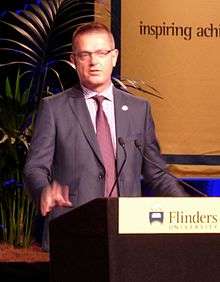Colin Stirling
Professor Colin J. Stirling is a Scottish biological scientist and academic. He currently lives in Adelaide, South Australia where he has held the position of Vice Chancellor of Flinders University since 2015.[1]

On Australia Day 2016 Stirling became an Australian citizen.
Career
Stirling holds a Bachelor of Science in Biological Sciences from the University of Edinburgh and completed a PhD in genetics at the University of Glasgow. He held a NATO Research Fellowship at the University of California, Berkeley, before being appointed to a Lectureship at the University of Manchester in 1990. He held the position of Professor of Genetics at the University of Manchester from 1998 to 2011, and served in various leadership positions including Education Dean in the Faculty of Life Sciences, Associate Vice-President eLearning and Vice-President for Teaching and Learning (2008-2011).
Stirling moved to Australia where he took up the position of Deputy Vice-Chancellor Academic at Curtin University in 2011 where he was later appointed Provost and Senior Deputy Vice-Chancellor,[1] before accepting the position of Vice-Chancellor of Flinders University in South Australia from January 2015.
Honours and Awards
- Royal Society Wolfson Research Fellowship (2006-2011)
- University of Manchester Distinguished Achievement Medal, "Researcher of the Year" (2005)
- Balfour Prize from the Genetical Society (1998)
- Fleming Award from the Society for General Microbiology (1997)
- The Lister Jenner Research Fellowship from the Lister Institute of Preventative Medicine (1993-1998)
- NATO Research Fellowship (1988-1990)
Personal Life
Stirling is married and has four children.
Role in university restructuring
Prior to his appointment in Adelaide, concerns were raised by the National Tertiary Education Union that Stirling could repeat restructuring plans implemented at Curtin with adverse impacts to staff and students.</ref>[2] Plans to restructure Flinders University emerged in 2016, during Stirling's second year in the position.[3] In 2017 the University's previous model of four Faculties and 14 Schools was transformed into six Colleges: College of Business Government and Law; College of Education, Psychology and Social Work; College of Humanities, Arts and Social Sciences; College of Medicine and Public Health; College of Nursing and Health Sciences and College of Science and Engineering. Professional services were restructured to align with the new model. In 2018 Flinders University embarked upon an academic restructure process which sought to increase staff levels and appoint Teaching Specialists, a move opposed by the local branch of the NTEU.[4] It claimed approximately 200 academic staff members could be affected and that the process could cost Flinders University over A$20 million, in addition to the recruitment costs for new staff members. Stirling believed that the restructure would produce improvements in the university's underlying performance, including growth in commencements and research funding.[5] The NTEU lodged several notices of dispute which the University referred to the Fair Work Commission. On 6 December 2018 recommendations[6] handed down by Commissioner Christopher Platt referred to the genuineness of the University's change proposals and stated that the organisational change process should continue with some urgency with the aim of all employees being advised of processes and outcomes as soon as possible.[7] A petition with some 250 signatories was presented to Flinders University Council calling for a review of the restructure process and contents. [8][9][10] The restructure went ahead and was effectively completed in early 2019.
In 2019 Stirling announced AUD$200m of strategic investments over five years with a AUD$100m investment in research and a matching AUD$100m investment in teaching and learning.[11]
References
- "Flinders University". www.flinders.edu.au. Retrieved 2016-10-24.
- Williams, Tim (2014-05-26). "Fears new Flinders University vice-chancellor Colin Stirling will cut staff levels like he did in WA". The Advertiser. Retrieved 2016-10-24.
- Williams, Tim (2016-08-15). "Flinders University reforms propose six 'colleges' to replace its four faculties and 14 schools". The Advertiser. Retrieved 2016-10-24.
- https://indaily.com.au/news/2018/12/07/heartless-cruel-disrespectful-unnecessary-uni-staff-slam-restructure-plan-in-tense-confrontation/
- https://www.theaustralian.com.au/higher-education/flinders-vicechancellor-happy-to-go-his-own-way/news-story/e654d7ec6135328fc98edbd939163b6d
- https://www.fwc.gov.au/documents/decisionssigned/html/pdf/2018fwc7426.pdf
- https://campusmorningmail.com.au/news/flinders-to-split-academics-into-research-or-teaching-roles/
- https://www.nteu.org.au/flinders/blog/Flinders-University-24
- https://www.abc.net.au/news/2018-10-19/more-than-200-flinders-academics-face-job-restructure/10391770
- https://campusmorningmail.com.au/news/teacher-only-academics-to-expand-as-flinders-u-rolls-out-long-expected-plan/
- https://campusmorningmail.com.au/flinders-u-is-firstest-with-the-mostest/